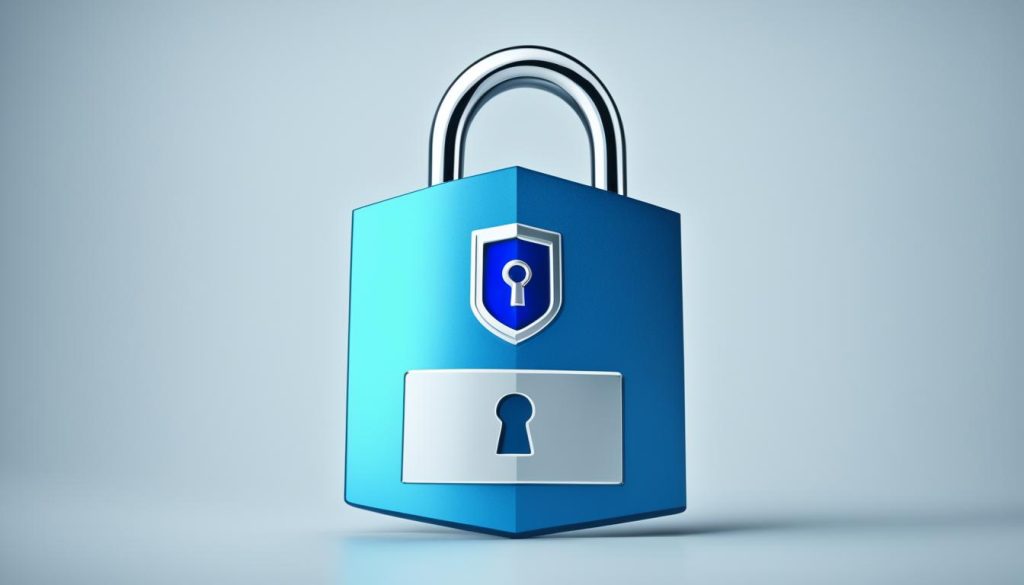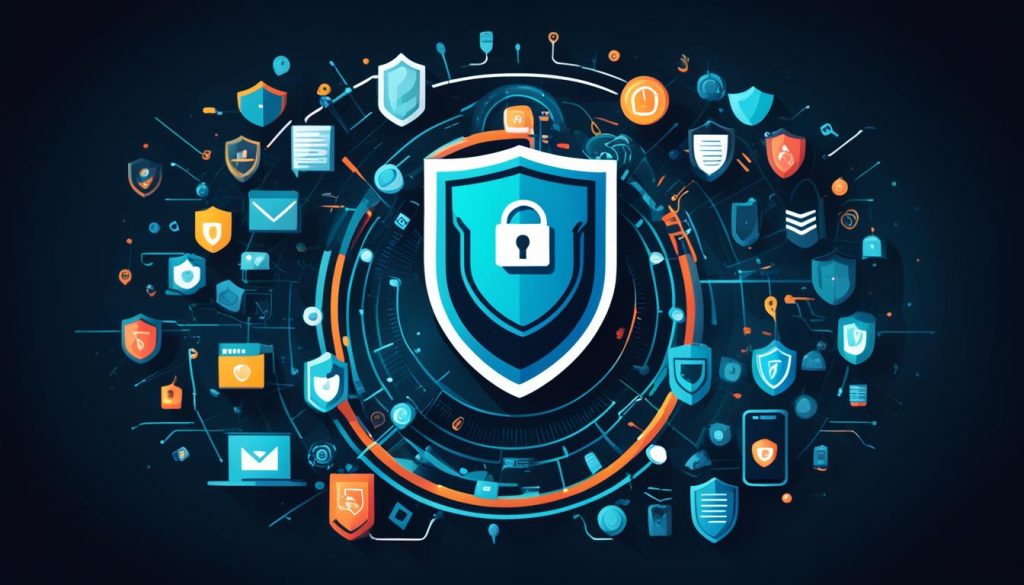Today, our lives are deeply connected to the internet. We use many devices and have lots of online accounts. This makes it easy for our personal info to end up in the wrong hands. Sadly, about 30% of smartphone users don’t even use simple security like passwords or locks, making their devices and data at risk.
This guide will give you key tips to keep your digital life safe and protect your privacy and data. We’ll talk about making strong passwords and using multi-factor authentication. These strategies are proven to help you stay safe online, no matter your age or how tech-savvy you are.
What is Cybersecurity?
Cybersecurity is all about keeping online data and digital systems safe from unauthorized access or theft. It’s vital in our digital world as we use the internet and connected devices more and more.
Cybersecurity Buzzwords to Know
Understanding cybersecurity means knowing some key terms. Data breach means unauthorized access to sensitive info. Malware is harmful software for computers. Backups are copies of data for recovery after a security issue. And cloud storage is a remote place to store and get data online.
Why is Cybersecurity Important?
Our lives depend more on the internet and digital tech every day. With more devices and accounts, cybercriminals have more chances to steal our personal info. Keeping our online data protection and digital security measures safe is key. The importance of cybersecurity is huge, as cyber attacks can lead to big financial losses, identity theft, and even threats to national security.

Internet Safety for Kids
As parents, we want our kids to safely explore the internet. The internet is full of learning, fun, and ways to connect with others. But, it also has risks we must tackle. By using good internet safety tips, we can help our kids stay safe online.
Parental controls and content filtering are key to keeping kids safe online. But, some online predators can get past these controls. That’s why it’s important for parents to watch what their kids do online. Talking to kids about safe online behavior and teaching them to spot and report bad interactions helps keep them safe.
The Children’s Online Privacy Protection Act (COPPA) says websites need parent permission to collect info from kids under 13. Many Internet service providers (ISPs) also offer tools to help control what kids see online. By using these tools and keeping up with online dangers, parents can make the internet safer for their kids.
- Online Communication Guidelines: Set rules for kids about how to talk online safely.
- Phishing Awareness: Warn kids about phishing online to protect their personal info.
- Password Security:
- Make passwords strong with a mix of letters, numbers, and symbols.
- Avoid using personal info like names or birthdays in passwords.
- Encourage making unique passwords for each account.
- Privacy Settings:
- Teach kids to use privacy settings to control what they share online.
- Promoting Kindness Online:
- Encourage kids to be kind online to fight negativity.
- Teach them not to spread bad messages and to block bad behavior.
- Communication: Stress the need for kids to talk openly with trusted adults about online issues.
Keeping our kids safe online is a constant job that needs watchfulness, learning, and action. By working together as a family and keeping up with the latest safety tips, we can help our kids enjoy the internet safely.

Internet Safety for Teens
As teenagers grow up, they’ll use the internet more on their own. It’s key for parents to keep talking about cybersecurity and online safety. By setting rules, teaching digital citizenship, and getting teens ready for safe internet use, parents can keep their young adults safe online.
Limit Technology Use
Setting limits on technology use helps teens form good habits. Parents should make a family media plan. This plan should cover device use, online activities, and screen time rules.
Keep Devices Out of Bedrooms
Keeping smartphones and other internet devices out of bedrooms helps reduce distractions and improves sleep. It also lets parents watch over their teen’s online activities better.
Talk About the Internet
Talking often about the internet’s risks and benefits helps teens think critically about online safety. Topics can include cyberbullying, online privacy, and responsible social media use.
Prepare Them For the Future
Parents should teach their teens about digital citizenship skills for the online world. This includes learning about password security, data protection, and safe online shopping.
| Key Risks for Teenagers Online | Percentage of Teens Affected |
|---|---|
| Receiving unwanted explicit material | 47% |
| Experiencing repeated cyberbullying | 25% |
| Being the victim of cyberbullying | 33% |
| Sharing personal information with strangers | 30% |
| Engaging with strangers online | 40% |
By using these online safety tips, parents can equip teenagers with the skills and knowledge to safely and responsibly navigate the digital world.

How to Protect Seniors Online
Seniors are often targeted by online scams because they have a lot of savings and assets. They might not report fraud because they feel ashamed or don’t understand what happened. It’s important to teach seniors and their families about how to stay safe online.
Family emergency scams are a big threat to seniors. Scammers might pretend to be a grandchild or another family member in trouble. They ask for money right away. Seniors should be careful with calls or emails that seem urgent and shouldn’t give out personal info or send money without checking it out first.
- Avoid sharing personal information online, such as birthdate, address, or financial details.
- Be cautious of unsolicited calls or emails claiming a family emergency.
- Verify the authenticity of any requests for financial assistance by contacting the family member directly.
- Use strong, unique passwords for all online accounts and enable two-factor authentication when possible.
- Keep devices and software up-to-date with the latest security patches.
- Consider using a virtual private network (VPN) and antivirus software to enhance online security.
Teaching seniors and their families about these scams and basic cybersecurity steps can help protect them from elder financial abuse and online fraud.

“Scammers often target seniors due to their lifetime savings and assets. It’s crucial to ensure seniors and their loved ones are aware of common cybersecurity best practices and tips for staying safe online.”
Cybersecurity 101: Basic Internet Safety Tips
Understanding the basics of cybersecurity is key to feeling safe online. Whether you’re just browsing, shopping, or sharing info, simple safety steps can protect your online world.
Protect Your Personal Information With Strong Passwords
A strong, unique password is your first defense against hackers. Aim for passwords over 12 characters long, with a mix of letters, numbers, and symbols. Don’t use easy-to-guess info like birthdays or pet names. Think about using a trusted password manager for all your online accounts.
Keep Personal Information Private
Be careful with the info you share online. Don’t share too much on social media and check your privacy settings. When shopping online, make sure the site uses HTTPS to keep your payment info safe.
Make Sure Your Devices Are Secure
Keep your devices like computers and phones updated with the latest software and security patches. Turn on two-factor authentication to add more security to your accounts. Using a VPN or privacy-focused browsers like Brave or DuckDuckGo can also boost your online privacy and security.
Pay Attention to Software Updates
Software updates often bring critical security fixes, so apply them quickly. Enable automatic updates to keep your devices and apps safe from new threats. Backing up your data regularly is also a smart move, in case something goes wrong.
By following these simple cybersecurity tips, you can lower the risk of data breaches and identity theft. This lets you surf the web with more confidence and peace of mind.

How to Secure Your Digital Life: Best Practices for Online Safety
Protecting your digital life is easier than you think. This guide offers tips to keep your online privacy and data safe. By using digital life protection strategies, you can lower your cybersecurity risk. This lets you enjoy the internet safely.
Using strong, unique passwords is key. Experts say your passwords should be over 15 characters long. They should mix letters, numbers, and special characters. This makes it harder for hackers to guess your passwords.
Enabling two-factor authentication is also vital. This extra step checks who you are before letting you into your accounts. It stops others from getting into your accounts, even if they know your password.
- Be careful with links and attachments that seem suspicious. They might carry malware that steals your info.
- Update your devices and software regularly to avoid security holes.
- Use a good antivirus program to find and remove malware. Also, think about using a secure VPN on public Wi-Fi.
Remember, once you post something online, it’s there forever. Think carefully before sharing anything. What you post can affect you for a long time.
| Top Antivirus Software | Rating |
|---|---|
| Avast One Basic | 4.5 Outstanding |
| Bitdefender Antivirus Plus | 5.0 Exemplary |
| McAfee AntiVirus | 4.0 Excellent |
| Norton AntiVirus Plus | 4.5 Outstanding |
| Sophos Home Premium | 4.0 Excellent |
Follow these cybersecurity best practices to protect your digital life. This way, you can have a safer online experience. Remember, staying safe online is an ongoing task. Always be alert and keep learning to stay ahead.
Essential Cybersecurity Practices
In today’s digital world, keeping your online presence safe is key. By using cybersecurity best practices, you can boost your online security measures. This helps protect your important info. Here are some important steps to keep your digital life safe:
Keep a Clean Machine
Update your devices and operating systems often. This makes sure they have the latest security updates. It helps fix known problems and keeps your devices secure.
Create Long, Unique Passwords
Good password management is vital for online safety. Don’t use easy-to-guess passwords. Instead, make strong, unique passwords for all your accounts to stop hackers.
Use a Password Manager
Use a password manager to handle all your passwords. This tool creates and keeps your passwords safe. It makes it easier to protect your accounts.
Enable Multi-Factor Authentication
Multi-factor authentication adds an extra security layer to your accounts. It makes it hard for hackers to get in. Turn this on whenever you can to protect your info.
Think Before You Click
Be careful with links and downloads, even if they seem safe. Phishing awareness is key to avoiding malware and data theft.
Report Phishing
If you think you’ve seen a phishing attempt, report it. Tell the right people or the fake site’s company. This helps stop others from getting tricked.
Use Secure Wi-Fi
Be aware of risks on public Wi-Fi networks. Use a VPN to encrypt your internet and improve your secure internet usage.
Back It Up
Back up your important data safely, like on cloud storage or hard drives. This data backup plan lets you get your info back if something goes wrong.
Check Your Settings
Look over and change your privacy settings on social media and other online places. This lets you control who sees your info and privacy settings.
Share with Care
Think before sharing online, as it can affect you for a long time. Practice responsible digital sharing to keep your privacy safe and your online image good.
By following these cybersecurity practices every day, you can greatly improve your online security measures. This keeps your digital life safe.
Additional Online Safety Resources
This guide has given you a lot of tips on staying safe online. But, there are more resources out there to help you keep your digital life secure. Groups like the Cybersecurity and Infrastructure Security Agency (CISA) and the Federal Trade Commission have lots of info. They cover everything from identity theft prevention to spotting and reporting online scams.
CISA has a lot of cybersecurity resources and online safety information on their site. They talk about protecting your personal data and safe browsing. The Federal Trade Commission also has guides on identity theft prevention and scam awareness. These guides help you know how to avoid online dangers.
There are also non-profits and companies that focus on digital privacy education and online safety. Sites like StaySafeOnline.org and ConnectSafely.org have lots of tools. They include interactive tutorials, guides you can download, and forums for the community. These help people of all ages stay safe and secure online.
| Organization | Focus Area | Key Resources |
|---|---|---|
| Cybersecurity and Infrastructure Security Agency (CISA) | Cybersecurity resources, online safety information | Comprehensive guides, educational materials, and alerts on latest threats |
| Federal Trade Commission | Identity theft prevention, scam awareness | Guides on avoiding and reporting online scams, protecting personal data |
| StaySafeOnline.org | Digital privacy education | Interactive tutorials, downloadable resources, community forums |
| ConnectSafely.org | Online safety information | Guides, tips, and advice for safe digital practices |
Using these cybersecurity resources and online safety information, you can protect yourself and your family. You’ll be able to move through the digital world with confidence. And you’ll be ready to face identity theft and scam threats.
Conclusion
In today’s world, keeping your online life safe is crucial. By following the online safety best practices in this comprehensive cybersecurity guide, you can lower your digital risks. This way, you can enjoy the internet safely.
Securing your digital life is easier than you think. Just update your passwords, use two-factor authentication, and watch out for online scams. These simple steps can protect you a lot.
Did you know that 60% of people’s personal info is at risk? Also, automated systems track us over 1,000 times daily on social media and online stores. To stay safe, use strong passwords, turn on two-factor authentication, and manage your privacy settings. These steps will boost your online security and privacy.


